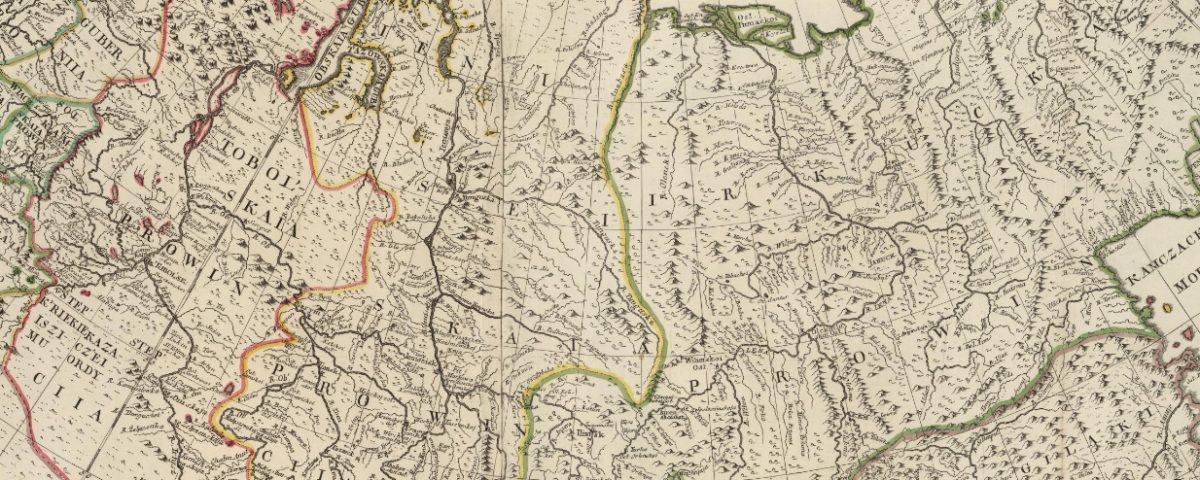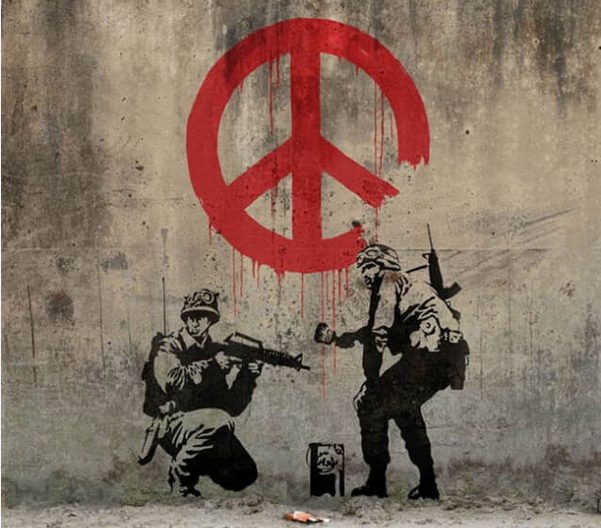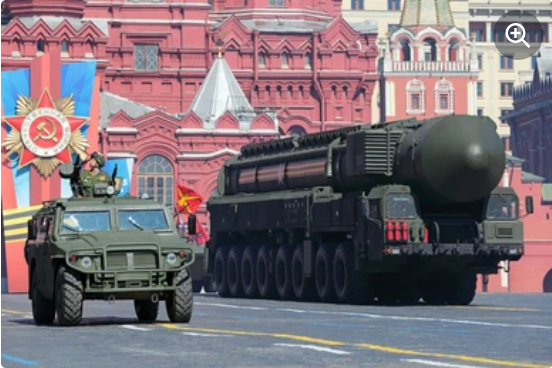


Facing Nuclear Vulnerabilities
16 April 2023
Why War?’ – A Philosophical Question?
16 April 2023The war in Ukraine has revealed the breadth and depth of Russian imperialism and colonialism. However, many analyses of the war still cling to the notion that Russia is innocent of imperialism. Isn’t this about the Russian nation defending its existence as it did during the Great Patriotic War? Isn’t Putin an unaligned leader fighting in Ukraine for the underdogs struggling against American imperialism? The facts are often blurred. However, the crude reality of a war that has thrust the Ukrainian nation onto the international political stage and revealed a brutal rejection of its decolonisation is not lost on the political elites of the non-Russian nations within the Russian Federation and around it. The war has surfaced the colonial and imperial character of Russia and perhaps given rise to decolonisation demands.
A War That Has Awakened Ethnic Minorities
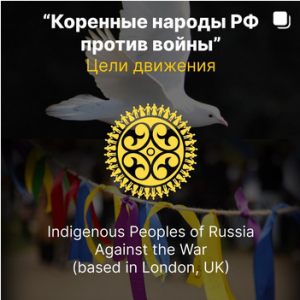
Instragram – Indigenous peoples of Russia against the war (based in London, UK). – Screenshot – 17-02-2023
In October 2022, various indigenous movements representing minorities in the Russian Federation addressed the United Nations to denounce the war waged in Ukraine and ask for protection and aid for those fleeing the mobilisation(1)An Appeal from Representatives of the Republic of Sakha (Yakutia) to the United Nations Office of the High Commissioner for Human Rights (OHCHR) . Claiming to be hostages of an aggressive Russia and its first cannon fodder, they denounced a corollary of the war in Ukraine: an ethnocide of Siberian national minorities sometimes only numbered in thousands or tens of thousands of people. At the beginning of January 2023, a group of activists from the indigenous peoples of Eastern Siberia – the ‘Asians of Russia’ – declared on Instagram that the new year should usher in the decolonisation of Russia(2)For more information see Ethnic Minorities Of Russia Against The War. Meanwhile, The New York Times devoted an article to the epic story of two citizens of the Russian Federation living by the Arctic Ocean in Chukotka (an ‘autonomous’ district located on the northeastern tip of Russia, with a shoreline overlooking the Bering Strait). One was Chukchi and the other Russian – nationality is not the same as citizenship in Russia, but rather an ethno-nationality – and both were fleeing the mobilisation by fishing boat across the Bering Strait, towards Alaska. (3)A Small Boat, a Vast Sea and a Desperate Escape From Russia, 23 January 2023, New York Times .
Compared to the current fighting and bombing on Ukrainian soil and the 7.5 million Ukrainian refugees outside their country, compared to the scale of the exodus of city dwellers from Russia’s European cities who are fleeing their country to avoid mobilisation, and compared to the maintenance of a pro-war majority opinion across Russia, including Siberia, these signals may appear to be very weak – the background noise of a war mainly playing out towards Europe.
Nonetheless, these phenomena give a signal. They underscore the extent to which the Russian war in Ukraine visually reveals the imperial and colonial dimension of the Russian Federation in both the West and the East. It is as if Russia was suddenly losing its imperial innocence(4)Botakoz Kassymbekova, Erica Marat, Time to Question Russia’s Imperial Innocence, PONARS Eurasia. New Approaches to Research and Security in Eurasia, Elliott School of International Affairs, The George Washington University, PONARS Eurasia Policy Memo April 2022..
An Unusual Colonisation
This ‘innocence’ is primarily rooted in the methods of Russian colonial and imperial conquest and their accompanying narratives.
The Russian Empire did not see itself as colonial but rather as multinational. The aggregation of territories by Moscow (and St. Petersburg when it became the capital between 1712–1918) was certainly achieved through war and conquest, but in the process, the peoples were supposed to save themselves from neighbouring imperial domination. The occupation of territories progressed by invitation, with the dominant theme of protection of Eastern Orthodox Slavs in the West and South. Meanwhile, in the East, manifest destiny and a civilising mission towards indigenous peoples legitimised the advance.
Thus, the Ukrainian Bogdan Khmelnitski, after his Cossack uprising against Poland-Lithuania in 1648, pledged allegiance to the Orthodox tsar through the treaty of Pereïaslav in 1654. For the hetmanate on the banks of the Dnieper, keen on its autonomy, the resulting alliance was temporary. However, the narrative that took hold in imperial Russia was that the alliance bore testament to a historical attachment, a reunification of principalities dispersed after the Mongol invasion, and the restoration under Moscow’s aegis of the Rus of Kiev.
In the West, the Russians engaged in reverse imperialism, somewhat like the Romans, having conquered Greece. They militarily dominated entities that, because of their history (formerly under the domination of Poland-Lithuania, Sweden, and German barons), had dynamic centres of culture and education that influenced cultural and religious developments in Russia. As Andreas Kappeler highlighted in his latest book, until the 18th century one could speak of a Ukrainisation of Russian culture, especially through the clergy from Kiev(5)Andreas Kappeler, Russes et Ukrainiens, les frères inégaux du Moyen Âge à nos jours, [Russians and Ukrainians, unequal brothers from the Middle Ages to today], CNRS éditions, 2022, p.86 et sq..But during the time of Catherine II and in the 19th century, when the Russian Empire reached its apogee, this cultural transfer from Ukraine towards Russia was forgotten. Moscow came to refer to Ukraine as Little Russia as it henceforth appeared as a province that was less civilised than the imperial centre.
In the East, colonisation carried out across continuous territory was also unusual. With the exception of the Caucasus, where conquest was strongly resisted, akin to the French conquest of Algeria, the military advance in Siberia and Central Asia proceeded from one to the next. Advances were made to protect oneself, to avenge a small defeat, or for the prestige of the uniform. But there was no overarching colonisation project and no clear economic or geopolitical motivations. Military violence and violence against civilians accompanied the conquests. The contact unleashed epidemics and undermined the indigenous communities with alcohol, money and weapons. The ensuing occupation remained ‘light’, however. Acculturation proceeded in both directions and slowly, without state voluntarism. It was not uncommon for the Cossacks – soldiers of the Empire who were organised into autonomous communities on its borders and the main drivers of colonisation – to adopt the agricultural practices of the indigenous population, while some natives converted to the Orthodox religion. Miscegenation was a reality, although the word does not exist in Russia. Rather, a more vague term was used – starozhily – to refer to people who had lived there for a long time. Delegation of power and political and cultural autonomy to local authorities was the most common practice in the colonial conquest. Native laws, religions, and customs remained unchallenged’(6)See Alexander Morrison, The Russian Conquest of Central Asia. A Study in Imperial Expansion, 1814-1914, Cambridge University Press , 2020.. The inorodtsy (literally those born different, i.e. the natives) were not directly integrated into Russia and did not have to fight to serve the Empire. Moreover, contrary to the idea that imperialism enriches colonisers, the Russian people did not really benefit from the conquest. As Vasily Klyushovsky (1841–1911), one of the first historians of the Russian Empire, wrote: ‘The state grew fat while the people grew lean'(7)Robert Byrnes, “Kliuchevskii on the Multi-National Russian State,” Russian History, Winter 1986.. It is also difficult to think of Russia as a colonial power, because before 1914 it was somewhat like the Ottoman Empire, considered as a semi-colony under the economic domination of the era’s real imperialists: the French, the British, and the Germans.
The Soviet Union: Spearhead of Anti-Colonialism
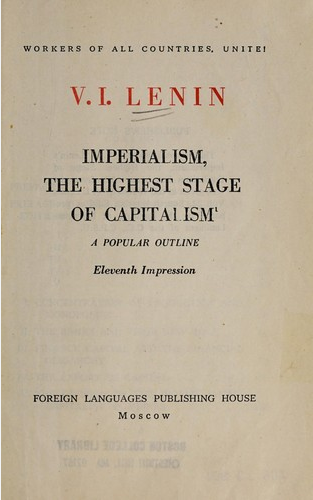 The Soviet experience compounded Russia’s imperial innocence. As a historian expert in the Caucasus (Ronald Suny) underscored, the Soviet Union is an Empire in denial. The Communist State-Party developed by revolutionising against the Empire. Trotsky denounced the secrecy of tsarist and western bourgeois diplomacy and published all the agreements between imperialists in the Russian Foreign Affairs Chancellery. Lenin, who devoted a famous book to imperialism as the highest stage of capitalism(8)Lenin: Imperialism, the Highest Stage of Capitalism (1917, published by Progress Publishers, Moscow 1963., endorsed peoples’ right to self-determination and minced no words in denouncing and combating what he called a conquering, brutal, and arrogant ‘Great Russian chauvinism’. He imagined a Union of federated republics and autonomous republics where Russia would be equal to other nations rather than above them.
The Soviet experience compounded Russia’s imperial innocence. As a historian expert in the Caucasus (Ronald Suny) underscored, the Soviet Union is an Empire in denial. The Communist State-Party developed by revolutionising against the Empire. Trotsky denounced the secrecy of tsarist and western bourgeois diplomacy and published all the agreements between imperialists in the Russian Foreign Affairs Chancellery. Lenin, who devoted a famous book to imperialism as the highest stage of capitalism(8)Lenin: Imperialism, the Highest Stage of Capitalism (1917, published by Progress Publishers, Moscow 1963., endorsed peoples’ right to self-determination and minced no words in denouncing and combating what he called a conquering, brutal, and arrogant ‘Great Russian chauvinism’. He imagined a Union of federated republics and autonomous republics where Russia would be equal to other nations rather than above them.
The patterns of Russian domination, however, resisted the Leninist tabula rasa. The centralism of Moscow’s Communist Party left little room for sovereignty in the republics of the new Soviet Union. Imperial methods reemerged during the civil war (notably with the annexation of the independent Georgia in 1921). Under Stalin, the imperialist pattern took precedence when in 1939 the secret protocols signed with Hitler enabled the Soviet annexation of new territories, including Eastern Galicia (now in Ukraine), which had belonged to Austria-Hungary and then to Poland.A ‘thick’ border(9)Sabine Dullin, La frontière épaisse. Aux origines des politiques soviétiques (1920-1940), [The thick border. The origins of Soviet policies (1920-1940)], Éditions de l’EHESS, 2014. was then erected. It had the features of a conquering Empire front.
But the reality was transmuted through propaganda. The Red army soldiers violating the Polish border carried out the internationalist duty in emancipating workers, peasants and dominated Ukrainian and Belarusian nations in the neighbouring countries. The existence of the secret protocols demarcating zones of influence in Eastern Europe was denied by the Soviet leadership until the Gorbatchev era. The imperialism was anti-imperialism. When the 300th anniversary of the reunification of Ukraine and Russia was celebrated with great pomp in 1954, all the imperial signals of Moscow domination over Kiev were invisibilized thanks to the dominant narrative of the friendship between peoples.
On the international scene, the Soviet Union succeeded in casting itself as the best alternative to imperialism and colonialism for the colonised and then decolonising countries – more so than the United States. Despite its technological and economic attraction, the United States was undermined by its Atlantic alliance with the old colonial powers of Europe and then by the Vietnam War. Soviet soft power in the Third World drew on transnational communist activist networks as well as a vast effort to train for a rapid model of development through planning and state control of the economy. The effort included training young people from the Third World in universities and sending co-operators, engineers, and technicians to Iraq, Egypt, Algeria, and Mozambique.
Cities like Tashkent, the capital of the Republic of Uzbekistan, showcased Russia’s successful internal decolonisation to Third World nations in the 1960s and 1970s. The war in Afghanistan, however, started darkening this picture in the late 1970s.
During the Soviet period, when nations appeared captive to Western observers, they were actually captive to the Kremlin’s communist and totalitarian ideology. Analysis by dissident and nationalist Ukrainian historians referring to their country as a colony of Russia barely registered. The great famine in Ukraine (the Holodomor) caused by Stalin’s policy of punishing Ukrainian peasantry and nationalism killed 4 to 5 million people in 1933. While the subject was taboo in the USSR, the work of historians covering it in the West rarely framed it as colonial subjection and imperial yoke. It was not until the 21st century that the colonial policies of the Soviets and then of the Nazis in Ukraine were analysed as such, for example, in Timothy Snyder’s Bloodlands(10)Timothy Snyder, Bloodlands. Europe between Hitler and Stalin, Basic Books, 2010 .
Putin, a ‘Worthy’ Successor
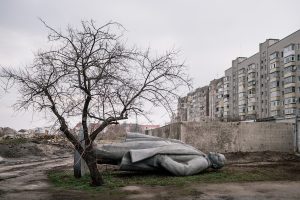
From Looking For Lenin, by Niels Ackermann and Sébastien Gobert, Ed. Noir sur Blanc, 2017. Kremenchuk, March 30, 2016.
Traces of this imperial innocence are still apparent in Putin’s Russia. He knows how to play with Eurasian ideas of a multinational Russia as a symphony of peoples in the Muscovite melting pot. He is one of a long line of leaders seeking to gather the lands of the Eastern Slavs to fight against foreign domination. He uses the discourse of the underdog Power rallying opponents of American imperialism. Despite the propaganda, the war in Ukraine has more clearly than before revealed Russia’s state construction as a colonial one. Putin abhors the federal legacy of Lenin and the republics’ right to secession that was enshrined in the Soviet constitutions and that led to the wave of Union’s Republics independence in 1991 with full recognition of the new states’ borders and sovereignty, including Ukraine. He abhors the legacy of the autonomous republics within Russia and has unravelled all the agreements signed during Yeltsin’s time, notably with Tatarstan and Yakutia-Sakha. He thus intends to resume what he perceived as an interrupted thread in the imperial fate of Russia and restore the supremacy of Moscow dominating and guiding other peoples.
The American Association for Slavic, East European & Eurasian Studies (ASEEES), which holds an annual convention, is dedicating the next one to the theme of decolonisation. The war in Ukraine challenges an excessively Russo-centric perspective in state policies and in studies on the Russian, Soviet and now Russian Empire. With the benefit of hindsight, would Russia, credited as a member of the UN Security Council with being the natural partner of NATO’s great powers, have been entrusted with the entire nuclear legacy of the USSR, while Ukraine, Belarus and Kazakhstan were asked to hand over its missiles? Does Russia not appear today to be the last colonial power in Europe conducting its special operation to avoid the inevitable: a decolonisation that might set in stone the independence of the former Union’s Republics and also call into question the current borders – including internal ones – of the Russian Federation?
As long as Putin succeeds in presenting himself to the Russians and the rest of the world as the anti-hegemon and convincing them that he has nothing to do with colonialism, it will consolidate the oppressive authoritarian regime within Russia and reinforce its imperial order. The colonial brutal methods used against Ukrainians and visible in the politics of war mobilisation may, however, dissipate faster than expected the still existing anti-imperialist aura of Russia.
Sabine Dullin is professor of contemporary history at Sciences Po and a researcher at Sciences Po’s Centre for History. She is developing a decentralised political history of the Soviet Russian Empire, attentive to borders, transnational dynamics, and borderland territorial and national sovereignties. She has recently published L’ironie du destin. Une histoire des Russes et de leur empire (1853-1991), Payot, Petite Bibliothèque, 2021 and co-edited The Russian Revolution in Asia. From Baku to Batavia, Routledge, 2022.
Notes

